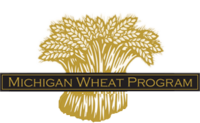Lansing, Mich. (Aug. 4, 2022) – A vital piece of the Michigan Wheat Program’s research agenda was released today with publication of the 10th consecutive year of high-management wheat research trials.
For over 30 years, Michigan State University has been conducting Wheat Performance Trials. And for the last 10 years, the Michigan Wheat Program has provided funding and resources to include a high-management component.
Farmers intending to plant wheat this fall should consult the report to learn more about the 125 different varieties – including 63 experimental lines – tested across Michigan. Growers can review the side-by-side results for these varieties under conventional and the high-management approach, according to MSU Wheat Breeder Eric Olson. Olson partners with MSU Wheat Specialist Dennis Pennington and Amanda Noble, Research Assistant. The team just completed harvest of the plots the end of July and finalized the report with the rest of the team earlier this week.
“The Michigan Wheat Program believes that high-management practices will be increasingly important for Michigan wheat growers in the years to come, and as a result we’ve supported the high-management plots for a decade now,” said Jeff Krohn, chairman of the nine-member Michigan Wheat Program board and a wheat farmer in Owendale.
“Data compiled in the high-management trials provides a great deal of information for farmers looking to take their wheat crop to the next level,” Krohn said. “The key is to find the varieties that work best for you.”
“The 2021-2022 high-management research trials took place in seven Michigan counties: Isabella, Hillman, Ingham, Huron, Montcalm, Sanilac and Tuscola,” according to MSU Wheat Specialist, Dennis Pennington. “The Sanilac site was severely water damaged last fall and had no results included in the report.”
The Tuscola and Isabella county sites allowed side-by-side comparisons across all 125 varieties of the high-management vs. conventional management practices. In Tuscola county, 15 seed varieties yielded less under high management, but the other 110 yielded more. The mean average was 3.0 more bu./acre in Tuscola and 2.1 bu./acre more at the Isabella County site.
While the average gain from high management was low this year, there were six varieties that had greater than 15 bu./acre gain. This is important information to consider when selecting varieties to plant this fall.
“Every wheat farmer should look at these results and consider how the varieties might perform in their particular farm management system,” said Dennis Pennington, MSU wheat specialist. “The goal of this project is to provide yet another tool for growers to help them stay on the cutting edge of production.”
This year’s Performance Trials include 62 commercial wheat varieties and 63 experimental wheat lines. The wheat seed lines were developed by 13 different organizations, including private sector seed companies, the Michigan Crop Improvement Association and Michigan State University through financial support from the Michigan Wheat Program.
Wheat trial details
During the 2021-2022 growing season, research plots were planted on privately-owned farms as well as the MSU Research Farms. This year’s trials at a private farm in Tuscola County had both conventional and high-management plots, to create a “same farm” comparison.
A big thank you goes to the Michigan farms hosting the 2021-2022 trials that included:
- Hauck Seed Farm of Rosebush (Isabella County)*;
- Darwin Sneller of Sebewaing (Huron County);
- MSU Mason Research Farm and MSU Fusarium Head Blight Nursery of Lansing (both, Ingham County);
- Woods Seed Farm of Edmore (Montcalm County);
- Todd Ableidinger of Hillman (Montmorency County);
- JGDM Farms of Sandusky (Sanilac County – no 2022 results due to rain damage); and
- Micah Laux of Reese (Tuscola County)*.
*Denotes high-management site
High-management wheat plots included an additional 30 lbs./acre of nitrogen (28% nitrogen), as well as Quilt Xcel® fungicide applied at Feekes 9.0, and Prosaro® fungicide at the average flowering date (Feekes 10.5.1) in each location.
“At its August meeting, the Michigan Wheat Program board will review in-depth results of the 2022 Wheat Performance Trials including high-management treatments and will again consider whether to fund this project in 2023,” said Jody Pollok-Newsom, executive director of the Michigan Wheat Program.
The Michigan Wheat Program is funded by about 8,000 farmers who grow wheat in at least 78 Michigan counties. The MWP board seeks to promote the state’s wheat industry by funding and supporting the strategic priorities of wheat farmers working with input suppliers, seed producers, millers, end users and consumers. Research on wheat production practices and grower education has and continues to be a priority for the organization.
